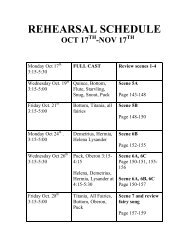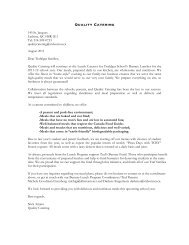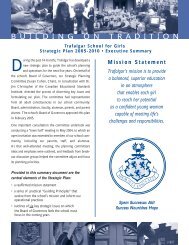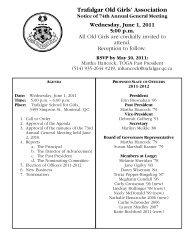Scholars and Explorers - Trafalgar School for Girls
Scholars and Explorers - Trafalgar School for Girls
Scholars and Explorers - Trafalgar School for Girls
You also want an ePaper? Increase the reach of your titles
YUMPU automatically turns print PDFs into web optimized ePapers that Google loves.
S e r v i c eMadeleine Parent 1936Attended <strong>Trafalgar</strong>: 1934-1936Education: BA, McGill University; Honorary Doctorate, Concordia UniversitySocial ActivistMadeleine Parent, a unionorganizer, labour leader <strong>and</strong>social revolutionary, startedher education at the Villa Mariaboarding school. Even as a younggirl, she was deeply disturbed by theinequality between the nuns, thestudents <strong>and</strong> the women working atOver the years, Madeleine helpedset up the Canadian Textile <strong>and</strong>Chemical Workers Union <strong>and</strong> foughtagainst the US-dominated labourunions in Canada. She campaigned<strong>for</strong> pay equity <strong>for</strong> women <strong>and</strong> wasactive in the Fédération des femmes duQuébec. She fought <strong>for</strong> abortion ona heretic <strong>and</strong> harassed by PremierMaurice Duplessis because hebelieved her to be a communist. Shewas arrested five times <strong>and</strong> convictedof seditious conspiracy in 1948, butacquitted. In her 80s, she marchedwith 60,000 protesters againstthe North American Free TradeAgreement <strong>and</strong> criticized Westernmilitary involvement in Iraq. McGillhonoured Madeleine with a seminar“I believe young women of all origins <strong>and</strong> circumstances will, in their own way, continuethe struggle against long-st<strong>and</strong>ing injustices, building coalitions with their sisters around theworld <strong>and</strong> with men who care. They will overcome.”the school. Transferring to <strong>Trafalgar</strong>to finish her secondary education,she continued her studies at McGill,where she received a Bachelor of Artsin 1940. Madeleine started her careerteaching English to French-speakinggarment workers <strong>and</strong> worked as asecretary <strong>for</strong> the Montreal Trades <strong>and</strong>Labour Council. She helped organizeworkers in six Montreal CottonDominion Textiles mills <strong>and</strong> tookpart in a strike that led to the firstcollective agreement with the UnitedTextiles Workers of America in 1946.Jean Scrimger Wootton 1936Attended <strong>Trafalgar</strong>: 1925-1936Military Intelligence - DecoderImagine a Trafite getting involvedin espionage during World War II.That is exactly what Jean ScrimgerWootton did. After graduating from<strong>Trafalgar</strong>, Jean found herself livingin Engl<strong>and</strong>. Her career in Britishintelligence began as a driver <strong>for</strong> MI6,the espionage division. Jean soonclimbed the ranks at MI6 because shespoke German <strong>and</strong> French, whichmade her very useful dealing withprisoners of war (POWs). She alsoworked in decoding at Bletchley Park,the site of the United Kingdom’smain decryption establishment,dem<strong>and</strong> <strong>and</strong> championed the rightsof aboriginal <strong>and</strong> immigrant women,devoting her life to improving therights of all women. She said, “Ibelieve young women of all origins<strong>and</strong> circumstances will, in their ownway, continue the struggle againstlong-st<strong>and</strong>ing injustices, buildingcoalitions with their sisters around theworld <strong>and</strong> with men who care. Theywill overcome.” Madeleine facedmany hardships to fight <strong>for</strong> whatshe believed in. She was denouncedby the Roman Catholic Church asthe Government Code <strong>and</strong> Cypher<strong>School</strong> (GC&CS). The high-levelintelligence produced at BletchleyPark, codenamed Ultra, providedcrucial assistance to the Allied waref<strong>for</strong>t. Many have speculated thatUltra shortened the war by two tofour years <strong>and</strong> that the outcome ofthe war would have been uncertainwithout it. Of course, Jean was swornto secrecy. In fact, she could notin her name in 2006 <strong>and</strong> Concordiaawarded her an honorary doctoratein 2009. Even in her decliningyears, living in a nursing home,she organized her fellow patientsto protest against an all-lights-outat-10-pmrule…<strong>and</strong> they won! Shedied in March 2012. For her tirelessdedication to <strong>and</strong> passion <strong>for</strong> equalrights <strong>for</strong> all, especially women,Madeleine is one of our 125 Womenof <strong>Trafalgar</strong>.Source: The Montreal Gazette <strong>and</strong> TheGlobe <strong>and</strong> Maildiscuss her involvement with MI6 <strong>for</strong>25 years after the end of World WarII. Even her family knew absolutelynothing about her dangerous <strong>and</strong>very important work until the early1970s. Jean died in 2010. For her“dangerous work in the predominantly male world of espionage”dedication to the war ef<strong>for</strong>t <strong>and</strong>dangerous work in the predominantlymale world of espionage, Jean is oneof our 125 Women of <strong>Trafalgar</strong>.Thanks to Jean’s cousin, Faith Feindel ‘37<strong>and</strong> sister Charlotte Corbett-Thompson ‘42<strong>for</strong> their assistance with this article.Valerie Sims 1948Attended <strong>Trafalgar</strong>: 1943-1948Education: BA (Economics), Sir George Williams University; MSW, McGill UniversitySocial Worker (Immigration/Health & Welfare)“Realizing there was little social research supportingFirst Nations communities, she <strong>and</strong> local staff…undertook asurvey to assess social needs in the Mohawk communityof Kahnawake near Montreal.”Valerie’s career began as alab technician at MerckPharmaceutical. She thenmoved to the Royal Victoria Hospital’sDepartment of Social Work, earningher BA in night school, majoring ineconomics, be<strong>for</strong>e attending theLondon <strong>School</strong> of Economics. Aspart of her course requirements,she worked <strong>for</strong> the City of London<strong>and</strong> the Plastic Surgery Hospitalin East Grinstead, Sussex, whereCanadian airmen with burns werebeing treated. Returning to Canada,Valerie completed her MSW atMcGill <strong>and</strong> moved to Ottawa towork in the Department of Labour’sVocational Rehabilitation Program,helping people overcome disabilities<strong>and</strong> return to or enter the work<strong>for</strong>ce. A change in direction tookValerie to the research branch of theDepartment of Labour <strong>and</strong> then tothe Department of Immigration. AsDirector General of one of the newbranches, she visited many CanadianImmigration departments in Canada<strong>and</strong> abroad. She joined the CanadianCouncil on Social Developmentas Acting Executive Director <strong>and</strong>combined her experience in socialwork, administration <strong>and</strong> researchfrom a community perspective. Sheretired from government but stayedon the Council. Realizing there waslittle social research supportingFirst Nations communities, she <strong>and</strong>local staff, with financial assistancefrom the Canadian Department ofHealth <strong>and</strong> Welfare, undertook asurvey to assess social needs in theMohawk community of Kahnawakenear Montreal, which helped thecommunity develop its social services.After retiring from the Council, Valeriecontinued to do social research <strong>for</strong>First Nations communities with otherconsultants. For her exceptional workwith Canada’s immigration program<strong>and</strong> on the Canadian Council onSocial Development combining socialwork, administration <strong>and</strong> research,particularly in support of First Nationscommunities, Valerie has been chosenone of our 125 Women of <strong>Trafalgar</strong>.125 Women of <strong>Trafalgar</strong> | 41
















